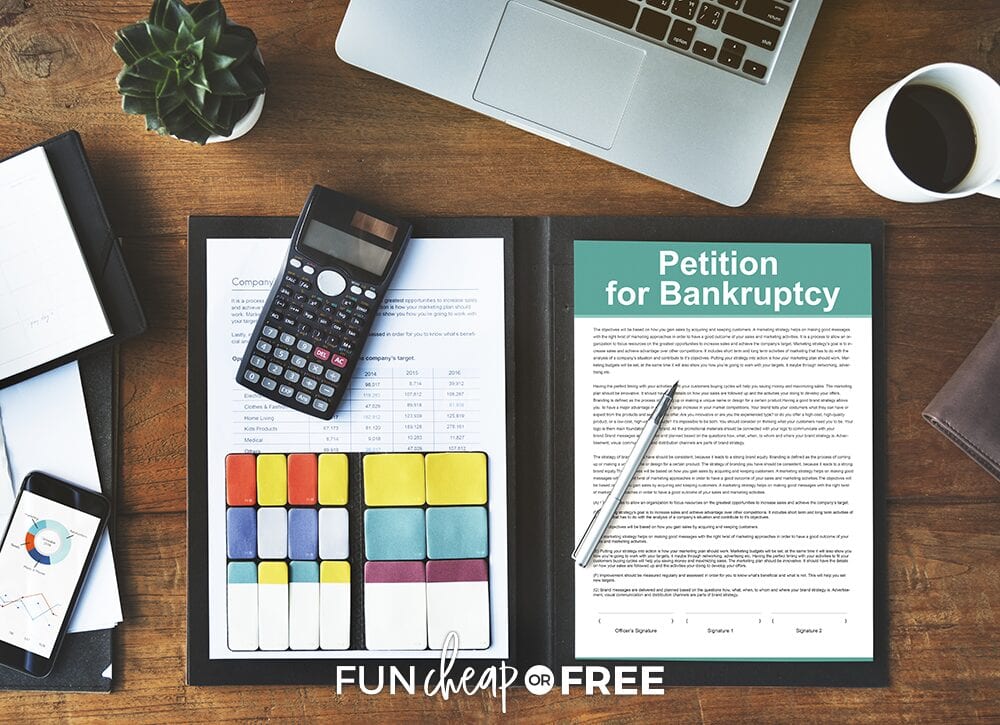What is bankruptcy? Today, we're going to walk you through all that you need to know about it, plus give you an option for getting out of debt!

Bankruptcy is a scary word, especially since most people don't exactly know what it means and how it works! Can you just say it out loud and it's done and over? Is it a quick and simple fix or does it take a long time to bounce back once it's been done?
*Note: When you click the links in this post, we may receive a commission at no extra cost to you.
Lucky for you, we're about to take a deep dive and answer that burning question: “What is bankruptcy?” You're about to become a master in all things bankruptcy and learn all about the pros and cons of it… So, are you ready to get to it or what?!
WHAT IS BANKRUPTCY?
It's a word we're all familiar with — and perhaps have a general idea about — but do you actually know what it entails and how it would affect you now and in the future? First, let's make sure we understand the definition of bankruptcy.
The Myriam-Webster dictionary defines being bankrupt as “a debtor (such as an individual or an organization) whose property is subject to voluntary or involuntary administration under the bankruptcy laws for the benefit of the debtor's creditors.”
Clear as mud??
Don't worry, it took a minute for it to sink in for us, too! Let's go over a few more details to help you understand it a little better.
WHAT IS THE BANKRUPTCY PROCESS?
Filing bankruptcy is a process, or a legal action, to be more specific. Unlike Michael Scott below, when you “declare bankruptcy,” you are filing legal court documents to ask help from a judge, based on the laws and regulations of your particular state.
In the video clip, Creed tells Michael that declaring bankruptcy will give him a clean slate and alleviate all his financial troubles. Oscar, the accountant and financial expert, disagrees. Who is right?
In the real world, declaring bankruptcy is an incredibly severe action with long-term consequences. It will change a person's life forever, and many people never bounce back. Bankruptcy goes on your public record and credit report for as long as ten years. Yes, you read that correctly!
For the first 1-3 years after declaring bankruptcy, you will not be able to open a bank account or get a credit card. It will be impossible to buy a home or a car, and most people find it nearly impossible to find a place to rent. Employers will see bankruptcies on your background check and can deny hiring you because of them. Insurance agencies can (and will) most likely drop you, as well.
Bankruptcy should be an absolute last-ditch effort after all other options have been thoroughly exhausted. And the kicker? Bankruptcy does NOT wipe the slate clean like Creed said it would! Student loans, back taxes, child support, and alimony are examples of debts not covered by bankruptcy that you will be responsible for the rest of your life until they are paid off.
WHAT ARE THE 5 W'S OF BANKRUPTCY?
Now that you've got the nitty gritty down of how the bankruptcy process works, let's go over a few more details to help you understand how it works a little better.
WHO FILES FOR BANKRUPTCY?

Both individuals and businesses can declare bankruptcy. We're going to focus in on individuals who have significant debts including, but not limited, to:
- Car loans
- Mortgages
- Back taxes
- Child support in arrears (aka money that is owed and should have been paid earlier)
- Credit cards
- Student loans
- Secured financed loans (such as that bedroom set or 80″ TV)
Since bankruptcy is a legal action, do you need a lawyer? No, not technically. Almost any time you go to court for any reason, you are allowed to represent yourself. That said, experienced lawyers can help aid in the process since bankruptcies can be long and complicated.
WHERE DO YOU FILE FOR BANKRUPTCY?
In your state's district court. Take Arizona, for example. There are four division offices which are located in Phoenix, Prescott, Tucson, and Yuma.
WHAT IS THE PROCESS TO FILE FOR BANKRUPTCY?

This differs from state to state, but here is the general procedure. First, you must gather and itemize all of your financial documents. These include your income sources, all your debts, all financial transactions for recent years, all your assets (like your home, car, bank account information, possessions, and so on), tax returns for recent years, any titles or deeds you have, and your monthly living expenses.
Before you can proceed any further in the bankruptcy process, you are legally required to attend credit/budget/debt counseling. These counselors are advisers who will comb over your documents and look for ways to resolve your debts without having to file bankruptcy. After you have undergone the required counseling, you must decide which classification of bankruptcy you qualify to file under: Chapter 7 bankruptcy or Chapter 13 bankruptcy. (Check part 2 for this information!)
WHAT HAPPENS AFTER BANKRUPTCY COUNSELING?
Once you have all of your documents in order, have paid the fees, and filed with the court, you will be assigned a court trustee. Either the trustee or a judge will handle your case proceedings. They will set up a meeting with you and all of your creditors (people you're indebted to) where you'll be asked questions and have to explain how you got into this financial trouble. Then, you will have to convince the judge or trustee that you should be discharged from (meaning not held accountable for) your debts.
What will happen after the meeting? If your bankruptcy petition is granted, you will be forced to comply with the court ruling by either selling off your possessions or entering into a repayment plan (more on this in part 2 of our bankruptcy series). If your possessions are to be liquidated, or sold, the trustee will assess the value of everything you own and sell off as much as they legally can (some items are protected, but not many) to collect as much money as they can to repay your creditors.
Family heirlooms, antiques, homes, cars, luxury items, everyday household items, prized possessions, and other cherished items belonging to you can go up for public sale. If you've ever seen an estate sale, then you've seen this process in action.
WHY DOES SOMEONE DECLARE BANKRUPTCY?
Life happens. Catastrophic medical events, divorces, or job loss are some of the life-changing events that can leave someone in financial ruin and unable to meet their financial obligations. Remember, bankruptcy should only ever be a last resort! There's such a far-reaching impact that it will have on every aspect of your life and your children's lives.
If events beyond your control wrench your life in a direction you can't recover from, that's one thing. However, if you are just tired of paying back money and wanting to escape the financial consequences of your purchasing actions, that reflects on who you are as a person.
Take this advice to heart: anyone who tries to sell you on the notion that bankruptcy is a good idea is either trying to get money out of you (like a credit counselor, lawyer, debt settlement agency, or others) or has no understanding of the concept.
Bankruptcy is a big deal and shouldn't be taken lightly.
HOW DO I AVOID BANKRUPTCY?

(This has a “W” in it, so we're counting it as one of the 5, mmkay?)
“How do I avoid bankruptcy? I've gotten myself into a financial mess, I don't see a way out, but I don't want all the negative impacts of bankruptcy to ruin the rest of my life. What can I do?”
The answer is right before your eyes, at your fingertips. Literally!
People find themselves on FunCheapOrFree.com for a variety of reasons, and what brought you here today isn't important. What IS important is the information available to you here. We have so much free information on the site that can help you get out of debt.
It will not be easy! It will be hard; it will require self-control, dedication, goals, and above all, sacrifice. But the payoff is SO worth it. There is no feeling in this world like that of not owing anyone any money!
HOW BUDGET BOOT CAMP CAN HELP YOU
There have been thousands of individuals, couples, and families who have had success not only getting their finances in order but also getting out of debt with Budget Boot Camp! It does cost a little bit of money, but we PROMISE you that it will be SIGNIFICANTLY less than what you will pay in attorney's fees, credit, and court costs. Check it out!
Oh, and by the way, if you don't save at LEAST what you paid for the program, you'll get a full refund. Seriously, you've got nothing to lose! Give Budget Boot Camp a try and see just how amazing it really is. Plus, use the code FCFBLOG to get an extra 10% off at checkout. Why? Because we want you to be successful in your journey to getting out of debt!
Alright, no more turning to the internet and typing in “what is bankruptcy?” for you! Be sure to check out part two of our bankruptcy series for even more information on bankruptcy. Let us know if you have any questions in the comments below!

Looking for more ideas to help you get out of debt?
- Use our simplest budgeting method to set up your monthly budget. This will set you up on the right track!
- Get out of debt using our 3 simple steps… Use our FREE printable debt tracker to help you out!
- Do a spending freeze now and be amazed at how much money you'll be able to save and put towards your debts in just one week!
Good luck crushing your debt! You can do this!

0 Comments